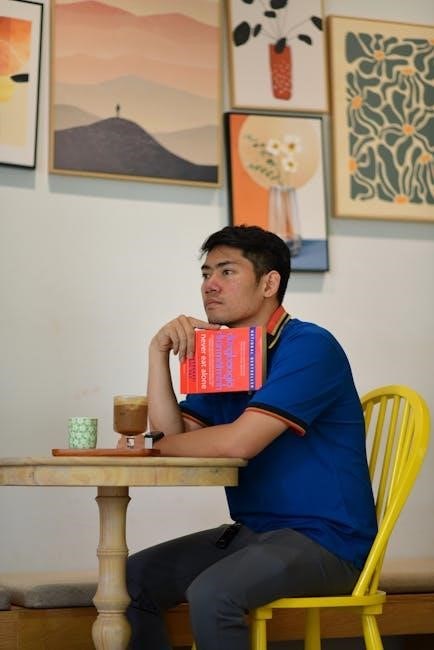
the book thief book pdf
The Book Thief, written by Markus Zusak, is a poignant novel available in PDF․ It explores humanity’s complexities during WWII, making it a sought-after digital read with its emotional depth and historical significance․

Overview of the Novel
The Book Thief, written by Markus Zusak, is a heart-wrenching tale set in Nazi Germany during World War II․ The story follows Liesel Meminger, a young girl who discovers the power of words and literature amidst the chaos of war․ Narrated by Death, the novel offers a unique perspective on the human experience, blending moments of beauty with the harsh realities of conflict․ Liesel’s journey from illiteracy to becoming the “book thief” highlights her resilience and the enduring impact of stories․ The novel explores themes of hope, loss, and the duality of human nature, making it a deeply emotional and thought-provoking read․ Available in PDF format, The Book Thief remains a widely read and cherished work of historical fiction․
Historical Context: Nazi Germany During World War II
Nazi Germany during World War II, as depicted in The Book Thief, was a time of immense oppression and fear․ The regime, led by Adolf Hitler, enforced strict control over society, suppressing dissent and perpetuating anti-Semitic ideologies․ The novel highlights the pervasive propaganda, the persecution of Jewish people, and the climate of terror imposed by the Nazi Party․ Liesel Meminger’s journey unfolds against this backdrop, showcasing the everyday struggles of ordinary Germans living under dictatorship․ The PDF version of the book captures the stark reality of wartime Germany, including the impact of airstrikes, food shortages, and the moral dilemmas faced by citizens․ Through Liesel’s story, the novel illustrates how individuals resisted oppression, often through small acts of defiance, such as stealing books, which symbolized the fight against ignorance and tyranny․

Literary Themes in The Book Thief
The Book Thief explores themes like the power of words, kindness versus cruelty, Nazi-era duality, and the responsibility of the living to the dead․

The Power of Words and Language
The Book Thief emphasizes the transformative power of words and language․ Liesel’s journey as a book thief highlights how literature can inspire hope and resilience in dire circumstances․ Words are portrayed as both weapons and tools for healing, reflecting their dual nature in Nazi Germany․ Through Liesel’s love for reading and writing, the novel illustrates how language can transcend oppression, fostering empathy and understanding․ This theme is central to the story, showing how words shape identities and provide solace amidst war and loss․ The novel underscores the enduring impact of language, whether used for propaganda or for human connection, making it a powerful exploration of its influence on the human spirit․
The Kindness and Cruelty of Humans
The Book Thief vividly portrays the duality of human nature, showcasing both extraordinary kindness and profound cruelty․ In Nazi Germany, characters like Hans and Rosa Hubermann exemplify compassion, offering refuge to Liesel and Max Vandenburg despite the risks․ Their actions highlight the resilience of humanity and the power of empathy in the face of oppression․ Conversely, the cruelty of the Nazi regime and its supporters underscores the darkness humans are capable of, particularly through acts of violence and discrimination․ Liesel’s friendship with Rudy Steiner further illustrates the capacity for love and loyalty, even in the most challenging times․ The novel explores how these contrasting behaviors coexist, reflecting the complexity of human nature․ Through these characters, Markus Zusak reveals the profound impact of both kindness and cruelty on individuals and communities during wartime․
The Duality of Nazi-Era Germany
The Book Thief reveals the stark duality of Nazi Germany, juxtaposing its propagandistic facade of order and unity with the underlying oppression and fear․ While the regime promotes a false sense of patriotism and racial purity, the novel exposes the brutal reality of persecution, particularly against Jews and dissenters․ Liesel’s small town of Molching, for instance, is portrayed as a place where ordinary people navigate the complexities of survival under dictatorship․ The duality is also evident in the contrast between the vibrant, albeit precarious, community life and the ever-present threat of Nazi authority․ Markus Zusak’s portrayal of this duality underscores the tension between hope and despair, as characters like Liesel, Hans, and Max resist the regime’s dehumanizing forces․ This duality serves as a backdrop to explore themes of resilience, morality, and the human condition during one of history’s darkest periods․
The Responsibility of the Living to the Dead
The Book Thief highlights the profound responsibility of the living to honor and remember the dead․ Through Liesel’s journey, the novel emphasizes the importance of preserving stories, memories, and the legacies of those who have passed․ Liesel’s act of stealing books becomes a metaphor for safeguarding knowledge and voices that might otherwise be silenced․ Death, the narrator, also underscores this theme by recounting the stories of those he collects, ensuring their lives are not forgotten․ The novel illustrates how the living must carry the burdens of the dead, keeping their memories alive and learning from their experiences․ This responsibility is not just a moral duty but a way to find meaning and purpose in a world torn apart by war and destruction․ By honoring the dead, the living find a way to heal and move forward․
Character Analysis

The Book Thief introduces complex characters like Liesel, Death, and Hans Hubermann, each embodying resilience and moral depth․ Their journeys explore humanity’s strength and vulnerability during WWII․

Liesel Meminger: The Book Thief

Liesel Meminger is the protagonist of The Book Thief, a young girl navigating Nazi Germany during WWII․ Her journey is marked by her love for words and literature, which becomes her escapism and strength․ Liesel’s character evolves as she faces loss, friendship, and the harsh realities of war․ Through her experiences, she learns the power of language and the importance of human connection․ Her nickname, “The Book Thief,” symbolizes her defiance and resilience, as she steals books to preserve knowledge and hope in a world dominated by oppression․ Liesel’s story is one of growth, empathy, and the enduring spirit of humanity amidst chaos․
Death: The Unconventional Narrator
Death, the narrator of The Book Thief, offers a unique and profound perspective on the events of the story․ Unlike traditional narrators, Death’s voice is both detached and deeply empathetic, providing a philosophical outlook on life, loss, and humanity․ His role is not merely to recount events but to reflect on the significance of human experiences, often intertwining dark humor with poignant insights․ Death’s narration highlights themes such as the power of words, the kindness and cruelty of humans, and the duality of life and death․ His interactions with Liesel, particularly in the final scenes, underscore his role as a guide and observer of human resilience․ Death’s unconventional storytelling style enriches the novel, offering readers a broader understanding of the story’s emotional and moral complexities․
Hans and Rosa Hubermann: Foster Parents and Moral Guides

Hans and Rosa Hubermann, Liesel’s foster parents, play pivotal roles in her life, offering love, support, and moral guidance during the tumultuous years of Nazi Germany․ Hans, with his calm and kind demeanor, becomes a father figure to Liesel, teaching her the value of compassion and courage․ His gentle nature and ability to connect with others, including Max Vandenburg, highlight his humanity and strength․ Rosa, though often stern and sharp-tongued, reveals a deep affection for Liesel and her family, showcasing her resilience and loyalty․ Together, they create a home filled with warmth, despite the harsh realities of war․ Their actions, such as hiding Max, demonstrate their moral courage and commitment to doing what is right, even in the face of danger․ Through their example, Liesel learns the importance of kindness, empathy, and standing up for what is just․

Max Vandenburg: The Jewish Fighter
Max Vandenburg, a Jewish boxer forced into hiding, becomes a significant figure in Liesel’s life․ His resilience and quiet strength inspire Liesel, as he endures immense suffering with dignity․ Despite his physical and emotional scars, Max’s spirit remains unbroken, symbolizing the fight against oppression․ His relationship with Liesel deepens through shared stories and mutual support, fostering hope amidst despair․ Max’s presence also highlights the harsh realities of Nazi persecution, as he is constantly at risk of discovery․ His courage and determination to survive serve as a testament to the human spirit’s ability to endure even in the darkest times․ Through Max, The Book Thief portrays the struggles of Jews during WWII, emphasizing their humanity and the moral imperative to resist injustice․
Rudy Steiner: Friendship and Sacrifice
Rudy Steiner, Liesel’s cheerful and loyal friend, embodies the essence of youthful innocence and selfless sacrifice․ His unwavering friendship with Liesel provides emotional support, especially during the harsh realities of wartime․ Rudy’s character is marked by his charm, humor, and deep affection for Liesel, which evolves from childhood playfulness to profound loyalty․ His tragic fate serves as a poignant reminder of the devastating consequences of war on innocent lives․ Through Rudy, the novel highlights the resilience of friendship and the enduring impact of small acts of kindness․ His story underscores the human cost of conflict, leaving a lasting emotional imprint on both Liesel and readers․ Rudy’s legacy becomes a symbol of hope and remembrance, inspiring Liesel to cherish memories and continue fighting for a better future․


Leave a Reply
You must be logged in to post a comment.